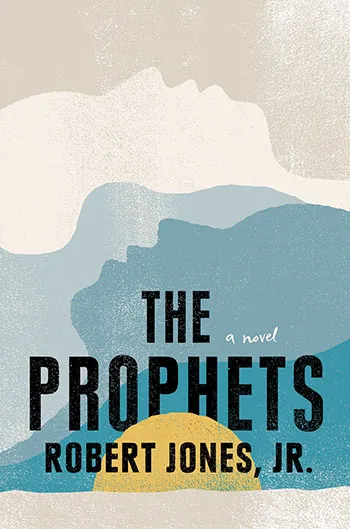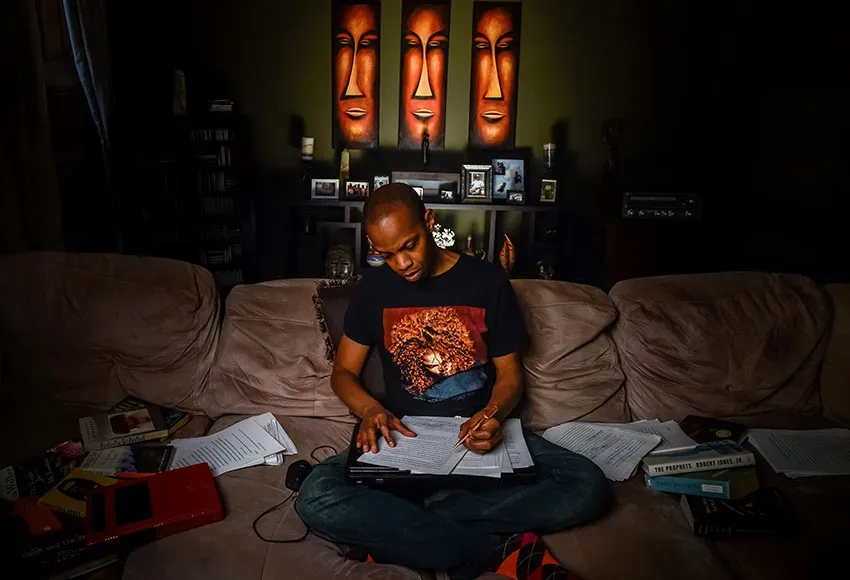Robert Jones Jr. fell in love with writing when he was six years old and his father bought him a Wonder Woman comic. "I wrote my first story as Wonder Woman's sidekick, and I had so much fun using my imagination in that way that I just kept writing," he remembered.
As a young adult, writing was a passion and a hobby, but Jones never felt he could pursue it professionally. "I had never seen a Black writer before," he explained.
Everything changed the day he read Terry McMillion's debut novel, Mama. "I had an epiphany that I could start writing about my own experiences and life. I took writing more seriously, but not seriously enough that I thought I could become a published writer," he said.
Like many great American writers, Jones had stories in his heart that needed to be told. The desire to become a professional writer never left. In his thirties, he returned to college to study creative writing. "I realized it was my purpose," he said.
Still, becoming a published writer was not an easy task. Passion doesn't pay the bills, and Jones had to find time to write while working multiple jobs and attending school.
"I was working three part-time jobs [as an] undergrad. I was working two part-time jobs in grad school. When I finally graduated, I had a full-time job. It was difficult to find time to write," he recalled. "I was writing, as Toni Morrison once put it, 'On the edges of the day.'"
Writing at 3 a.m.
Jones was determined to make his dreams come true, so he pushed himself to make time for his craft. He would write on his commute to work but found that still wasn't enough.
"I could no longer keep treating my art as secondary and not primary, so I made a deal with myself. I said, 'Set the alarm for 3 a.m., write for at least an hour, go back to sleep at 4 or 4:30, and then set the alarm again for 6:30 to go to work. If you are a writer like you say you are, you will commit to this.'"
Every morning, even Saturday and Sunday, he would get up at 3 a.m and write, he said. "Whether it was one sentence, one paragraph, or one page. I would sit and write for one hour."
Jones admits writing so early every day was physically and mentally draining, but he felt he owed it, not only to himself but to his ancestors, to finish his novel.
"I spent six years in school for this express purpose of honing my artistic talent, so I did not want it to go to waste," he said.
After 14 years, two degrees, and countless very early mornings, Jones finally finished his debut novel, The Prophets.
Critics have compared him to Toni Morrison, a writer he aspires to emulate. "Every time I set pen to paper, I am striving to be as good as Toni Morrison was," he said.
Aside from Morrison, some of his favorite writers are James Baldwin, Zora Neale Hurston, Wallace Thurman, Alice Walker, Gale Jones, Gloria Naylor, Jean Toomer, and Chinua Achebe. "I owe [them all] a great debt for inspiring me to write, teaching me how to write, showing me how to write," he said.

"What about love?"
His inspiration for The Prophets came from a question formed in his African studies courses. "My work always comes from a question I want an answer to. I weave my way through these words until I come to some conclusion, if not a complete answer," he explained. "I read a tremendous amount of wonderful works by Black authors, but I was curious and a bit perplexed about why Black Queer figures didn't start to show up until the 1920s."
The earliest references to Black Queer people were in the 1929 book The Blacker the Berry by Wallace Thurman. "That raised a question for me: did Black Queer people just not exist before then?" he wondered.
Jones began researching historical accounts of Black Queerness to answer his questions. "I kept finding references to sexual assault between two males or rape between a slave master and an enslaved person, and that brought another question for me: what about love?"
Jones concluded that the heteronormative imagination could not hold room for two Black men in love before the Harlem Renaissance. "They could only imagine Queer sexual encounters through the lens of rape culture," he said. "So, I said I wanted to write a love story about two enslaved young men on a plantation in Mississippi, where it's love and not the result of some trauma or pathological construct. These are just two young men who genuinely love each other."
Full of striking contradictions, The Prophets shows the power and beauty of Queer love to overcome even the most horrific episodes of human cruelty. When asked why he set a novel about Black Queer joy against the backdrop of American slavery, Jones said, "The reason why is because I wanted to strike back at this false notion that Black American people are Queer because slavery corrupted us. I wanted to show that slavery did not make us Queer. Queerness is just a natural part of the human experience. In fact, what slavery and colonialism introduced us to, truly, is anti-Queerness and anti-Transness."
Uncovering the truth about Indigenous Queer and Trans identities
The Prophets is a novel grounded in years of research. Jones spent just as much time writing the book as he did researching precolonial ideas of gender and sexuality in Indigenous American and African nations.
"I drew upon all of the canonical works I was reading as an African studies minor, so slave narratives and stuff of that nature. I also read anthropological works of sociologists and anthropologists investigating the ideas of gender, gender identity, sex, and sexuality, particularly on the African continent," he explained.
Of course, colonization and white supremacy have led to the destruction of many crucial histories of Indigenous peoples across the globe. This made Jones' research particularly challenging. He relied on oral histories and sociological studies to make his fictional world feel authentic.
Through his research, Jones discovered some surprising things about LGBTQ+ history.
"The biggest surprise for me was the discovery that all of these Indigenous peoples, villages, cities, and tribes had such modern ways of thinking about gender and sexuality," he said. He was shocked to learn that in ancient Nigeria, people did not use gendered pronouns, nor were children assigned a gender at birth. Adults would determine their own gender. In other African tribes, the word "king" was used to describe a ruler of any gender.
"In one African tribe, the Dagara people of Burkina Faso, if you were born Queer, you were special, because you occupied this liminal space. You had access to the afterworld," Jones explained. "So you would be the emissary, the missionary, the guardian between the here and the hereafter, and you could commune with the ancestors and the gods."
Learning about the ways precolonial African nations viewed gender and sexuality changed the way Jones saw his own identity and challenged the idea that "Africa is a homophobic place."
"That's all I had ever heard growing up, so discovering these new things – true things -– about the African continent was such a surprise," he said. "Indigenous people had a broader understanding of gender and sexuality, such that a Trans person wasn't unusual or strange, or something that even needed its name to separate itself from cisgenderness. It was all a part of the human experience. Discovering that helped me to push back at these false ideas and to open the door for this story."
What's next?
The Prophets was released in 2021 to wide critical acclaim and quickly became a New York Times bestseller. The novel's success has allowed Jones to become a full-time writer, something he does not take for granted.
"It feels so fulfilling to now have all the time in the world to commit to my art," he said.
He is working on his second book, another historical novel about Black Queer people in America.
"All I can say about it now is that it takes place in the late '80s and early '90s in New York City. It, too, stems from a question – a question I won't reveal just yet," he said.
In the meantime, Jones is working on several essays and preparing to give a lecture at Marygrove Conservancy on his experiences at a predominantly white master's program.
For anyone who would like to keep up on Robert Jones Jr.'s speaking tours, newsletter, or essays, visit https://www.sonofbaldwin.com/. Jones's debut novel, The Prophets, is out now, so read along with us at the SGN Book Club!


